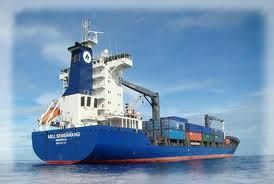
It was mid-afternoon one day early this year when workers at a factory in the Malaysian state of Perak finished loading more than 700,000 condoms into a shipping container.
The container was then driven to Port Klang, the busiest port in the country, and loaded onto a ship bound for Japan.
It was a routine procedure for Sagami Rubber Industries, a Japanese company, but by the time the ship docked in the port of Yokohama at the end of January, the condoms had vanished.
“The container was empty,” said K.K. Leung, the administration manager at Sagami’s Malaysian factory, whose Japanese colleagues had alerted him to the theft.
The case of the missing condoms made headlines in Malaysia, but it was not an isolated case, according to industry groups.
Sagami, they say, was another victim of cargo theft, an underreported crime that sometimes includes violent hijackings.
The transporting of goods through countries in the Asia-Pacific region is generally safer than in other parts of the world — like the Americas, Africa and Europe — according to data collected by FreightWatch International, an organization in the United States that collates information on cargo theft from around the world.
But the organization’s global threat assessment report published in February said that “there’s little question that cargo theft and supply-chain risk have increased throughout Asia” — a worry for international companies as economic momentum shifts eastward.
Malaysia, which lies along a number of important trading routes, is a particular concern. The country is increasingly becoming a major thoroughfare as more companies ship their goods to and from neighboring Singapore, one of the world’s busiest ports, which is connected to much of the rest of Southeast Asia by a road through Malaysia.
Industry groups say the number of companies taking preventive measures like hiring armed guards to protect their trucks in Malaysia has increased in recent years, amid growing awareness of the threat of cargo theft.
“There’s a syndicate in Malaysia, which is quite rampant,” said Alvin Chua, president of the Federation of Malaysian Freight Forwarders. He added that this group of bandits had focused on trucks carrying electronics in recent years.
The freight federation holds regular information sessions for its 1,200 members in which they discuss how they can better protect their cargo with measures like installing GPS devices and attaching electronic seals to containers to track their location around the globe.
The measures to increase security appear to be having an effect, though. Figures provided by the Malaysian police show that cargo crime has declined in recent years, from 357 reported incidents in 2006 to 60 last year. In the first four months of this year, 21 incidents were reported. The police figures list the number of incidents, but not the value of the goods stolen.
Fadil Marsus, superintendent of the criminal investigation department of the Malaysian police, said a number of operations conducted by the police and cooperation with the industry had helped reduce freight crime.
But the precise level of cargo theft in Malaysia has proved hard to pin down.
Companies are reluctant to report thefts because they are afraid the information may damage their reputations and increase their insurance premiums, said Tony Lugg, the Asia representative of the Transported Asset Protection Association, a nonprofit organization that provides security advice to technology and logistics companies.
The association estimates that over $22.7 million worth of goods was reported stolen from Malaysian ports, airports, warehouses and trucks from 2007 to 2010.
Because of companies’ uneasiness about reporting thefts, the actual amount of cargo stolen in Malaysia is probably higher than figures from the association or the police indicate, Lugg said.
FreightWatch International cited Malaysia and the Philippines as countries in Asia that report frequent occurrences of in-transit cargo hijackings with violence or the threat of violence.
In the United States, which has been experiencing a surge in cargo theft, bandits rarely resort to violence.
Regardless of their locations, most hijackings are inside jobs in which someone involved in transporting the goods leaks information to the thieves, Lugg said.
Cargo theft was often carried out by organized crime groups and could result in multimillion-dollar losses for companies, both in terms of the loss of merchandise and in production delays, he added.
In Malaysia, the police confirmed that six people were arrested in the Malaysian condom theft, and 90 percent of the stolen condoms were recovered.
Sagami’s Leung said that no company employees were among those arrested.
He said he believed it was most likely that the culprits had links to workers in the freight company that transported the condoms, which he declined to name.
Source: The New York Times
We use cookies to improve your experience. By continuing to use our site, you accept our Cookies, Privacy Policy,Terms and Conditions. Close X